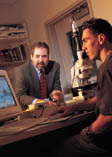 Mixing and matching Is this cancer treatment of the future? You go to your doctor's office for an appointment. A technician snips a tiny bit of tissue for analysis. A pathologist places it in an automated machine that processes it and comes back with a precise analysis of your cancer what genes are over-expressed, what genes are mutated, what genes are missing. When you come back for treatment, you'll get just the prescription of surgery, radiation or chemotherapy for your specific tumor type. This kind of designer therapy is decades away, but researchers like Paul Gumerlock are working to make it happen. An associate professor of hematology/oncology, he studies the biological pathways that cause cancer, trying to find, as he puts it, "the Achilles' heel in each person's tumor type." "We know that all cancers are not alike," he says. "You can have two patients with non-small cell lung cancer - the same type, the same stage, but one will respond to treatment and the other doesn't. We think it has to do with underlying molecular abnormalities in tumor cells. These differences are at the heart of why one person responds to therapy and the other doesn't." Gumerlock's job is to test cancer cells against novel cancer drugs that are so new they are only available in laboratory settings. In preclinical studies, he tests drugs on human prostate and lung tumor cell lines to see how they affect cell death and proliferation. In correlative studies he monitors how cancer patients with known genetic profiles responded in clinical trials to these drugs, sharing the information with oncologists planning treatment for cancer patients. His research serves as the foundation for new understandings of the molecular genetics of cancer and, ultimately, for new treatments.
Home |
Table of Contents |
To our Readers |
Building on Basics UC Davis Health System | © 2000, 2001, 2002 UC Regents. All rights reserved. |
Studying how cells respond to novel drugs, Paul Gumerlock investigates better ways to kill cancer. |

